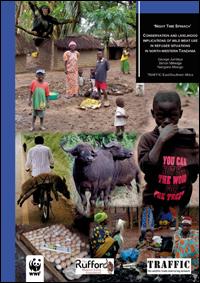
'Night time spinach': conservation and livelihood implications of wild meat use in refugee situations in north-western Tanzania
The implications of unsustainable wild meat exploitation for wildlife management and livelihoods in the refugee hosting areas of north-west Tanzania are rarely acknowledged by all the relevant stakeholders. This study takes a focussed look at wild meat use in refugee situations in north-western Tanzania, associated impacts, driving forces, and the appropriateness of some of the management interventions taken to date. The study outlines why enforcement of wildlife laws and regulations cannot address the drivers of unsustainable wild meat use in these, and other, refugee hosting areas. The study goes on to justify how positive incentives, whether via equitable market frameworks for wild meat or through provision of alternative sources of protein or livelihoods, may better reconcile refugee needs, local development imperatives and wildlife management objectives. Measures are recommended to stakeholders, including policy makers, refugee support agencies and wildlife managers, to broaden the complement of policy and programme responses.

